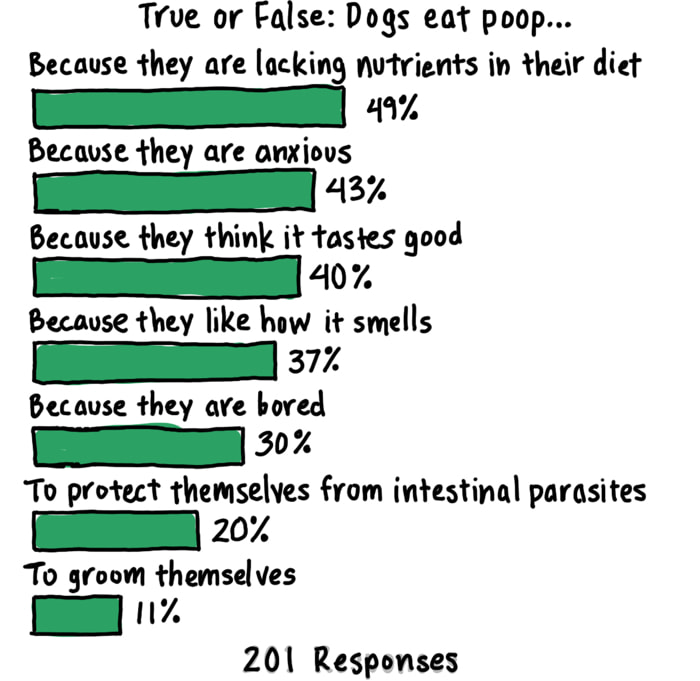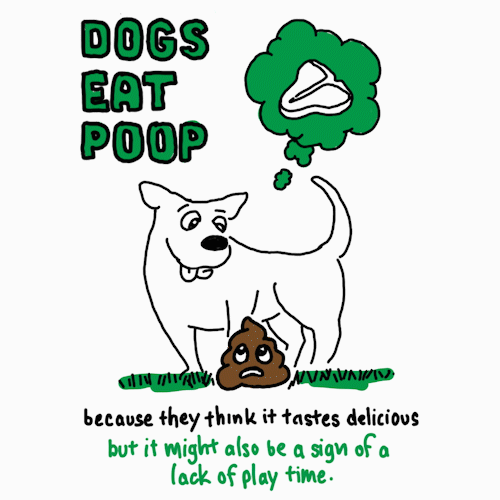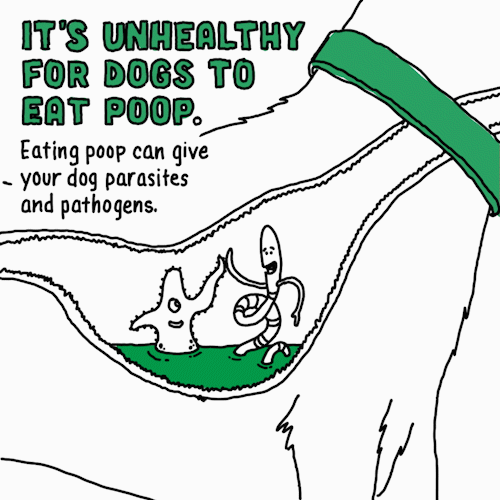

Like any companion or roommate, dogs — for all their love and cuteness—have habits we just don’t understand. One question dog owners often ask their pets: “Why? Why would you eat poop?”

When we polled* dog owners recently, most thought it was because a dog is lacking nutrients (49%), they’re anxious (43%) or they just think it tastes good (40%).
Dogs are significantly more likely to eat the droppings of another species (e.g., horses, rabbits) than their own.
We held our noses and got to the bottom of the issue with the help of some experts.
While those in our poll thought this was the number-one reason for the behavior, it has actually never been proven. “It’s a myth dogs eat poop because they’re seeking nutrients they aren’t getting. There’s no evidence to back this,” says
Opens a new windowDr. Jo Gale, BVetMed CertLAS MRCVS, Senior Manager, Global Science Advocacy at Waltham Petcare Science Institute.

According to Opens a new windowDr. Tammie King, Applied Behavior Technical Leader at Waltham Petcare Science Institute, “It can occur where there is lack of environmental enrichment. You see this often in dogs who are kenneled and have a lack of opportunity to exhibit normal canine behavior.” So if you need another excuse to get out and play with your pooch, this is a good one.
Believe it or not, this is the main reason dogs eat poop. Dr. Jo Gale explains: “Dogs are scavengers by nature and use any opportunity to eat what they can, when they can. They consider it a ‘tasty snack.’” Dr. Tammie King adds that “[Dogs eating poop] is a learned behavior. They’ve done it, enjoyed it, and that behavior is repeated.”
We love our dogs so much that we’re willing to trust our best friends on this. Maybe we should come out with a line of doggie breath mints though. Hmm.

“Ingesting feces from any animal increases potential for ingesting parasites and pathogens,” cautions Opens a new windowDr. James Serpell BSc, Phd Professor of Humane Ethics & Animal Welfare at University of Pennsylvania School of Veterinary Medicine. He went on to say, “[It’s] not something humans should ignore, but it's not worth getting too excited about it.”
All the experts we consulted said that if your dog occasionally eats poop, it’s nothing to be overly alarmed by. Just keep an eye on the frequency and their overall health. And as always, make sure they’re getting a nutritious diet and plenty of exercise and attention. If you have any concerns contact your vet.
Despite dogs liking the taste of poop, we’re going to stick with the healthy range of more traditional flavors offered in all IAMS dog foods.
*Surveyed U.S. dog owners, age 18+
Sample Size: n=201
Fielded May 8 to May 10, 2020


Dog multivitamins have become an increasingly popular supplement in pet care, designed to support overall canine health and well-being. Just as humans benefit from a balanced diet, dogs also require essential vitamins and minerals to maintain optimal health. These supplements are formulated to fill potential nutritional gaps in a dog's diet, ensuring they receive the necessary nutrients for proper growth, immune function, and energy levels. Multivitamins can be particularly beneficial for dogs with specific dietary restrictions, older dogs, or those recovering from illness. However, it is essential for pet parents to consult with veterinarians to determine the appropriate supplement and dosage for their furry companions.
Vitamins for dogs are essential organic compounds crucial for various physiological functions in both humans and dogs. These micronutrients, including A, B-complex, C, D, and E vitamins, play key roles in immune function, bone health, energy metabolism, and skin maintenance. Multivitamins for dogs consolidate these vital nutrients, providing a comprehensive and balanced nutritional boost to address potential dietary deficiencies.
If you are looking for vitamins for dogs in the Philippines, the IAMS dog supplement range has you covered. Tailored for canine needs, these supplements are particularly beneficial for dogs with specific health conditions, dietary restrictions, or those requiring additional support for overall well-being.
Yes, multivitamins and vitamins for dogs can prove to be very useful, especially in specific life stages or health situations. While quality dog food is designed to meet most nutritional needs, supplements become more valuable for puppies, seniors, pregnant or lactating females, and dogs with health conditions. These stages are the most crucial and are the best time to give multivitamins to dogs.
Caution is crucial, as human vitamins can be harmful to dogs. Consulting a veterinarian is essential to determine if supplementation is necessary, ensuring the right dosage and nutrient balance. Veterinarians assess the dog's health, diet, and medical history to provide tailored recommendations, enhancing well-being without posing risks. Judicious use of vitamins, under veterinary guidance, can benefit certain canine companions.
Integrating dog multivitamins into your furry baby’s diet offers a spectrum of benefits. These supplements contribute to enhanced immune function, promoting resilience against illnesses. Additionally, they support healthy skin and coat, minimising issues like dryness and shedding. For puppies, vitamins aid in proper growth and development, while senior dogs may experience increased vitality and joint support. Multivitamins are particularly valuable for dogs with specific health concerns, such as joint problems or allergies. Overall, vitamins for dogs act as nutritional insurance, ensuring that dogs receive the essential elements vital for their overall health and vitality.
When administered thoughtfully and under veterinary guidance, dog multivitamins can prove to be extremely beneficial. While quality dog food provides essential nutrients, supplementation becomes crucial in addressing specific needs or potential deficiencies. However, it is vital to avoid self-prescribing human vitamins, as certain substances can be toxic to dogs. Professional advice ensures that the supplementation is tailored to the dog's unique requirements, promoting overall well-being without adverse effects. Responsible use of vitamins, guided by a veterinarian, can contribute to a dog's health and vitality.
Ensuring your furry friend receives the right balance of vitamins and minerals is crucial for their overall health. While a well-balanced diet is the foundation of canine nutrition, certain situations may call for certain good vitamins for dogs as additional support. This is where vitamin and mineral supplements come into play. Dog multivitamins are specially formulated to address potential nutrient gaps, supporting everything from immune function to bone health.
In addition to supplements, incorporating nutrient-dense foods into your dog's diet is essential. Some of the best dog vitamin sources are:
Meat: Lean meats like chicken and turkey provide essential proteins, vitamins, and minerals such as B vitamins, iron, and zinc.
Fish: Fatty fish like salmon and mackerel are rich in omega-3 fatty acids, promoting a healthy coat and supporting cardiovascular health.
Vegetables: Dark, leafy greens such as spinach and kale offer vitamins A, C, and K, as well as minerals like calcium and iron.
Fruits: Berries, apples, and bananas are not only tasty treats but also provide vitamins and antioxidants.
Dairy: Plain yoghurt and cheese supply calcium and probiotics, benefiting bone health and digestion.
Balancing your dog's diet with both high-quality dog food and these natural sources can contribute to their overall well-being, reducing the need for excessive reliance on supplements. Always consult with your veterinarian to tailor your dog's nutritional plan based on their specific needs.
Vitamins and minerals are indispensable for a dog's overall health, playing pivotal roles in various physiological processes. These micronutrients act as catalysts for enzymatic reactions, supporting metabolism, growth, and energy production. Calcium and phosphorus, for instance, are crucial for bone health, ensuring proper skeletal development and strength. Iron is essential for oxygen transport in the blood, while zinc promotes skin health and wound healing. These micronutrients collectively contribute to the maintenance of a dog's immune system, vision, and cardiovascular health. Recognising the importance of vitamins and minerals underscores the significance of a well-rounded and nutritionally balanced diet, supplemented as needed, to meet the unique requirements of individual dogs.
The incorporation of vitamins and minerals into a dog's diet through supplements or nutrient-rich foods is a proactive approach to ensuring their overall well-being. While high-quality dog food serves as a foundation, targeted supplementation can address specific needs and contribute to a dog's vitality at different life stages. Consulting with a veterinarian is paramount, as they can provide tailored recommendations based on a dog's health profile. By understanding the benefits and importance of these micronutrients, pet parents can take informed steps to optimise their canine’s nutrition with the best dog multivitamins, supporting a happy, healthy, and thriving life for their furry friends.


Dog multivitamins have become an increasingly popular supplement in pet care, designed to support overall canine health and well-being. Just as humans benefit from a balanced diet, dogs also require essential vitamins and minerals to maintain optimal health. These supplements are formulated to fill potential nutritional gaps in a dog's diet, ensuring they receive the necessary nutrients for proper growth, immune function, and energy levels. Multivitamins can be particularly beneficial for dogs with specific dietary restrictions, older dogs, or those recovering from illness. However, it is essential for pet parents to consult with veterinarians to determine the appropriate supplement and dosage for their furry companions.
Vitamins for dogs are essential organic compounds crucial for various physiological functions in both humans and dogs. These micronutrients, including A, B-complex, C, D, and E vitamins, play key roles in immune function, bone health, energy metabolism, and skin maintenance. Multivitamins for dogs consolidate these vital nutrients, providing a comprehensive and balanced nutritional boost to address potential dietary deficiencies.
If you are looking for vitamins for dogs in the Philippines, the IAMS dog supplement range has you covered. Tailored for canine needs, these supplements are particularly beneficial for dogs with specific health conditions, dietary restrictions, or those requiring additional support for overall well-being.
Yes, multivitamins and vitamins for dogs can prove to be very useful, especially in specific life stages or health situations. While quality dog food is designed to meet most nutritional needs, supplements become more valuable for puppies, seniors, pregnant or lactating females, and dogs with health conditions. These stages are the most crucial and are the best time to give multivitamins to dogs.
Caution is crucial, as human vitamins can be harmful to dogs. Consulting a veterinarian is essential to determine if supplementation is necessary, ensuring the right dosage and nutrient balance. Veterinarians assess the dog's health, diet, and medical history to provide tailored recommendations, enhancing well-being without posing risks. Judicious use of vitamins, under veterinary guidance, can benefit certain canine companions.
Integrating dog multivitamins into your furry baby’s diet offers a spectrum of benefits. These supplements contribute to enhanced immune function, promoting resilience against illnesses. Additionally, they support healthy skin and coat, minimising issues like dryness and shedding. For puppies, vitamins aid in proper growth and development, while senior dogs may experience increased vitality and joint support. Multivitamins are particularly valuable for dogs with specific health concerns, such as joint problems or allergies. Overall, vitamins for dogs act as nutritional insurance, ensuring that dogs receive the essential elements vital for their overall health and vitality.
When administered thoughtfully and under veterinary guidance, dog multivitamins can prove to be extremely beneficial. While quality dog food provides essential nutrients, supplementation becomes crucial in addressing specific needs or potential deficiencies. However, it is vital to avoid self-prescribing human vitamins, as certain substances can be toxic to dogs. Professional advice ensures that the supplementation is tailored to the dog's unique requirements, promoting overall well-being without adverse effects. Responsible use of vitamins, guided by a veterinarian, can contribute to a dog's health and vitality.
Ensuring your furry friend receives the right balance of vitamins and minerals is crucial for their overall health. While a well-balanced diet is the foundation of canine nutrition, certain situations may call for certain good vitamins for dogs as additional support. This is where vitamin and mineral supplements come into play. Dog multivitamins are specially formulated to address potential nutrient gaps, supporting everything from immune function to bone health.
In addition to supplements, incorporating nutrient-dense foods into your dog's diet is essential. Some of the best dog vitamin sources are:
Meat: Lean meats like chicken and turkey provide essential proteins, vitamins, and minerals such as B vitamins, iron, and zinc.
Fish: Fatty fish like salmon and mackerel are rich in omega-3 fatty acids, promoting a healthy coat and supporting cardiovascular health.
Vegetables: Dark, leafy greens such as spinach and kale offer vitamins A, C, and K, as well as minerals like calcium and iron.
Fruits: Berries, apples, and bananas are not only tasty treats but also provide vitamins and antioxidants.
Dairy: Plain yoghurt and cheese supply calcium and probiotics, benefiting bone health and digestion.
Balancing your dog's diet with both high-quality dog food and these natural sources can contribute to their overall well-being, reducing the need for excessive reliance on supplements. Always consult with your veterinarian to tailor your dog's nutritional plan based on their specific needs.
Vitamins and minerals are indispensable for a dog's overall health, playing pivotal roles in various physiological processes. These micronutrients act as catalysts for enzymatic reactions, supporting metabolism, growth, and energy production. Calcium and phosphorus, for instance, are crucial for bone health, ensuring proper skeletal development and strength. Iron is essential for oxygen transport in the blood, while zinc promotes skin health and wound healing. These micronutrients collectively contribute to the maintenance of a dog's immune system, vision, and cardiovascular health. Recognising the importance of vitamins and minerals underscores the significance of a well-rounded and nutritionally balanced diet, supplemented as needed, to meet the unique requirements of individual dogs.
The incorporation of vitamins and minerals into a dog's diet through supplements or nutrient-rich foods is a proactive approach to ensuring their overall well-being. While high-quality dog food serves as a foundation, targeted supplementation can address specific needs and contribute to a dog's vitality at different life stages. Consulting with a veterinarian is paramount, as they can provide tailored recommendations based on a dog's health profile. By understanding the benefits and importance of these micronutrients, pet parents can take informed steps to optimise their canine’s nutrition with the best dog multivitamins, supporting a happy, healthy, and thriving life for their furry friends.